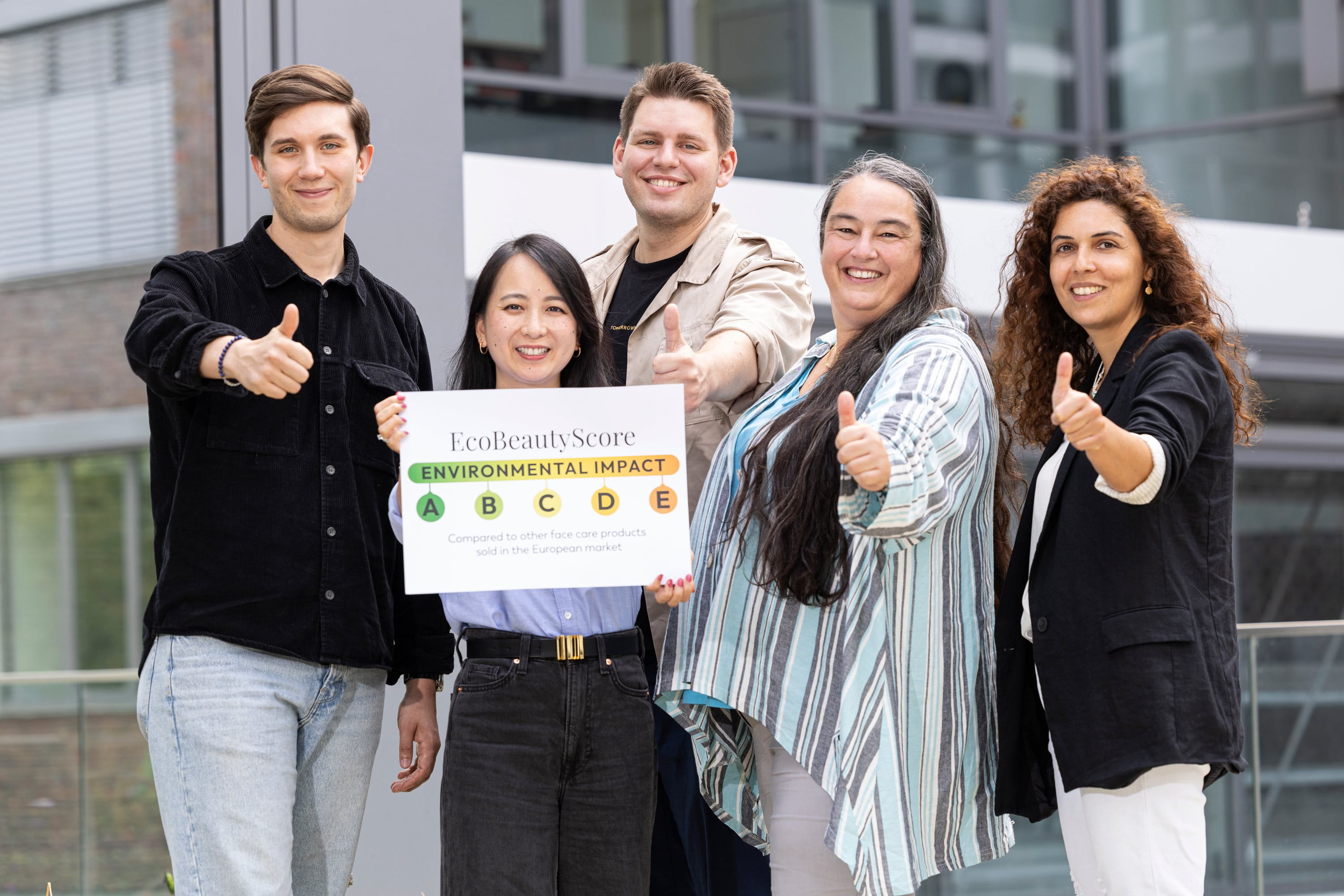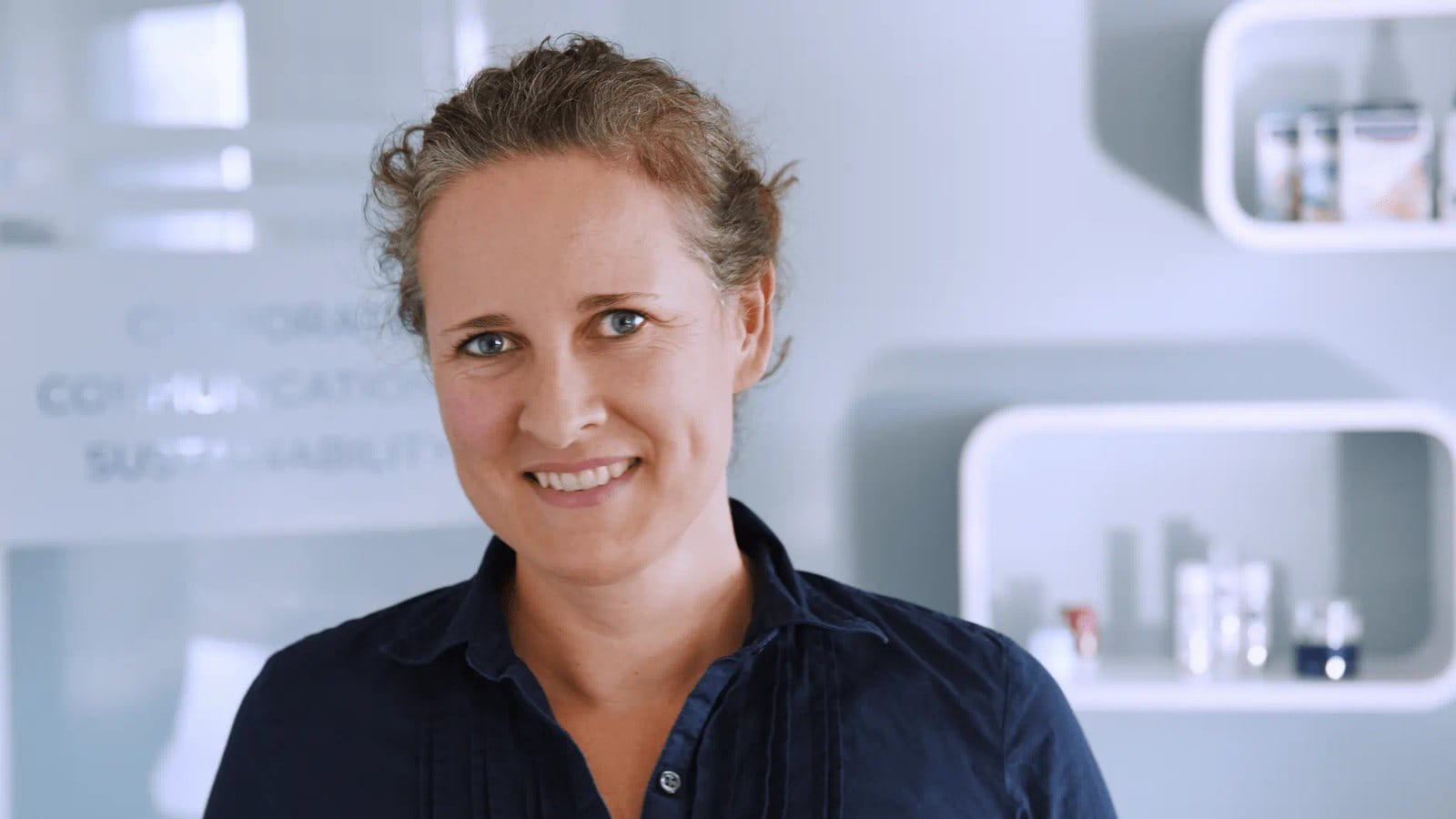With the launch of the EcoBeautyScore, a milestone was reached by the cosmetic industry: This new transparency label for consumers has been developed over more than three years in a collaborative effort with more than 70 companies involved. How did our Beiersdorf experts support this initiative and what was needed to bring the EcoBeautyScore to life for NIVEA and Eucerin? Find out in this Blog Story.
United for Impact: Our Team behind the EcoBeautyScore

When did this initiative start, Anke, and how did you contribute to it?
Anke: The project officially started in January 2022 with the foundation of the EcoBeautyScore consortium. We as Beiersdorf liked the idea very much and contributed with our expertise into the different workgroups to bring it to live.
I was part of the “Scoring” workgroup as an expert for formula technologies and consumer understanding. We segmented the cosmetic industry into consumer-relevant groups according to the primary use of the products. This was needed to allow consumers using the score to make relevant comparisons and – based on that – a conscious purchase decision.
Additionally, we developed a system that translates the environmental impact of a product into a score – and we tested it with consumers if they understand and appreciate this kind of scoring system. Finally, we also developed the design. But I did not do this alone, I was in close exchange with other Beiersdorf experts to integrate a broad view and expertise across functions.
How did you get involved in the EcoBeautyScore development, Pascal?
Pascal: I also contributed to the EcoBeautyScore initiative since 2022. I’ve
been involved in defining the scientific set-up of the score.
I worked closely
with the EcoBeautyScore team, contributing to both strategic aspects and the hands-on
development. In this context, I was part of a workgroup that ensured our
approach is as closely aligned as possible with the European regulation known
as the “Product Environmental Footprint” (PEF) while adapting it where
necessary to the specific needs of the cosmetics industry.
Since the ‘Go-Live’ of the tool in March 2025, I have been applying it in practice by calculating the scores for our NIVEA and Eucerin Face Care assortments. It’s great to see how the score can help to integrate sustainability into product development as it allows to identify opportunities for eco-design improvements. At the same time it can create additional transparency for our consumers and support them in making more sustainable purchase decisions.
What makes this project truly remarkable to me is the collaborative spirit across the different companies: Everyone has been genuinely committed to building a solution that is practical and usable for large, medium and small-sized companies. Discussions were always grounded in scientific rigor, yet open to diverse perspectives.
Yen, what have been your responsibilities as the project lead for NIVEA?
Yen: As the implementation lead for NIVEA, I was responsible for bringing the scores to life for our consumers. So, basically, I received the ‘Go’ from Pascal, once the scores were available, and then took care of everything after that. This included creating and driving all marketing assets — from our dedicated NIVEA web page with explanatory EcoBeautyScore content – to all European product detail pages for NIVEA Face Care to embed the respective score. Of course, it was a pleasure to see our NIVEA Face Care products score so well with A and B scores – a great achievement!
I would like to mention that the implementation of the EcoBeautyScore for our Beiersdorf brands was a collaboration across many departments, such as R&D and Corporate Sustainability, IT and Digital Marketing, Corporate Communications, and our regional and local marketing colleagues across Europe. There have been many more colleagues besides us that had a stake in it. It’s been a tremendous team effort — and I’m super proud to have been part of it!
Meral, you handled the implementation for Eucerin. What has been a challenge?
Meral: Being a part of the EcoBeautyScore Team and leading the implementation for Eucerin has been a very purposeful and inspiring experience for me. I think the biggest challenge was implementing the EcoBeautyScore at speed — especially since we were simultaneously re-designing our international Eucerin Sustainability website. Setting up the scores across our international website meant touching numerous product detail pages at the same time and it turned out to be quite complex and involved many people.
Looking back, I am very proud of what we achieved: The EcoBeautyScores are now fully implemented across the Eucerin Face Care assortment, with all our products achieving A or B scores – reflecting years of comprehensive efforts and dedication. Being part of this project-team allowed me to support transparency and bring to life what Eucerin stands for: We take responsibility. For your skin. And our planet.
Last, but not least, Sebastian: you managed the integration of the EcoBeautyScore tool into our Beiersdorf IT-landscape – how did that work out?
Sebastian: We from Beiersdorf IT were also involved from the beginning. Together with other consortium members we discussed and planned the technical infrastructure of the tool and went through a vendor selection process. After the first version of the tool was released, we were also part of the beta testing group and supported the audit process.
In parallel, we prepared our IT infrastructure within Beiersdorf to be ready. Here our previous work within our ‘Sustainability Digitalization Program’ paid off, as this allowed a lean data integration process. Our systems are now able to store the EcoBeautyScore result for each product, so that from there, the right label is featured on our NIVEA and Eucerin websites. More than 100 Face Care products were scored and uploaded across both brands in the end – and the IT-dimension of the project was also a great team-effort – stretching across several IT-domains and stakeholders.
Related Links
About the editor: Katrin Selzer

Katrin has been working at Beiersdorf since 2003. After various positions in marketing, strategy, digital and PR, she is since September 2018 Senior Communication Manager and responsible for the topic of sustainability. For Katrin, sustainability has a high personal relevance, since it changes the world for the better – and she contributes by communicating about it. Her communication is very passionate and she tries to also push the topic forward. In her private life, she is constantly seeking new ways and means to live a more sustainable lifestyle and inspire others with it.
